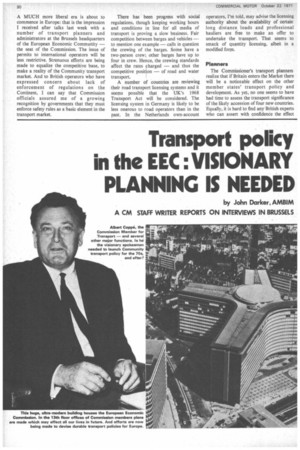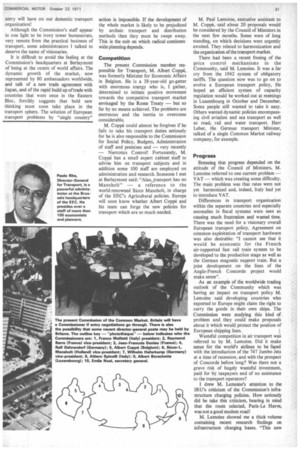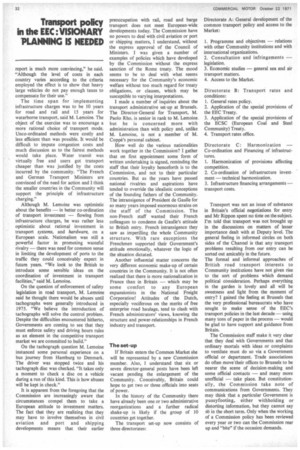Transport policy in the EEC :VISIONARY PLANNING IS NEEDED
Page 32

Page 33

Page 34

If you've noticed an error in this article please click here to report it so we can fix it.
by John Darker, AMBIM A CM STAFF WRITER REPORTS ON INTERVIEWS IN BRUSSELS
A MUCH more liberal era is about to commence in Europe: that is the impression I received after talks last week with a number of transport planners and administrators at the Brussels headquarters of the European Economic Community — the seat of the Commission. The issue of permits to international operators will be less restrictive. Strenuous efforts are being made to equalize the competitive base, to make a reality of the Community transport market. And to British operators who have expressed concern about lack of enforcement of regulations on the Continent, I can say that Commission officials assured me of a growing recognition by governments that they must enforce safety rules as a basic element in the transport market. There has been progress with social regulations, though keeping working hours and conditions in line for all media of transport is proving a slow bosiness. Fair competition between barges and vehicles — to mention one example — calls in question the crewing of the barges. Some have a two-person crew; other barges have up to four in crew. Hence, the crewing standards affect the rates charged — and thus the competitive position — of road and water tran sport.
A number of countries are reviewing their road transport licensing systems and it seems possible that the UK's 1968 Transport Act will be considered. The licensing system in Germany is likely to be less onerous to road operators than in the past. In the Netherlands own-account operators, I'm told, may advise the licensing authority about the availability of certain long distance_ loads and professional hauliers are free to make an offer to undertake the transport. That seems to smack of quantity licensing, albeit in a modified form.
Planners
The Commissioner's transport planners realize that if Britain enters the Market there will be a noticeable effect on the other member states' transport policy and development. As yet, no one seems to have had time to assess the transport significance of the likely accession of four new countries. Equally, it is hard to find any British experts who can assert with confidenee the effect entry will have on our domestic transport organization!
Although the Commission's staff appear in one light to be ivory tower bureaucrats, very remote from the practical business of transport, some administrators I talked to deserve the name of visionaries.
It is difficult to avoid the feeling at the Commission's headquarters at Berlaymont of being at the centre of world affairs. The dynamic growth of the market, • now represented by 80 ambassadors worldwide, and talk of a new trade agreement with Japan, and of the rapid build up oftrade with countries that were once in the Eastern Bloc, forcibly suggests that bold new thinking must soon take place in the transport sphere. The solution of European transport problems by "single country" action is impossible. If the development of the whole market is likely to be prejudiced by archaic transport and distribution methods then they must be swept away. This is the nub on which radical continentwide planning depends.
Competition
The present Commission member responsible for Transport, M. Albert Coppe, was formerly Minister for Economic Affairs in Belgium. He is a 38-year-old go-getter with enormous energy who is, I gather, determined to initiate positive movement towards the competitive transport market envisaged by the Rome Treaty — but so far by no means achieved. The problems are enormous and the inertia to overcome considerable.
M. Coppe could almost be forgiven if he fails to take his transport duties seriously for he is also responsible to the Commission for Social Policy, Budgets, Administration of staff and premises and — very recently — Narcotics Control! Fortunately, M. Coppe has a small expert cabinet staff to advise him on transport subjects and in addition some 100 staff are employed on administration and research. Someone I met at Berlaymont said: "Alas, jransport has no Mansholt" — a reference to the world-renowned Sicco Mansholt, in charge of the EEC's Agricultural policies. Europe will soon know whether Albert Copp& and his team can forge the new policies for transport which are so much needed. M. Paul Lemoine, executive assistant to M. Coppe, said about 20 proposals would be considered by the Council of Ministers in the next few months. Some were of long standing, on which decisions were urgently awaited. They related to harmonization and the organization of the transport market.
There had been a recent freeing of the price control mechanisms in the Community, said M. Lemoine. It was a far cry from the 1962 system of obligatory tariffs. The question now was to go on to evolve a European transport policy, He hoped an efficient system of capacity regulation would be worked out at meetings in Luxembourg in October and December. Some people still wanted to take it easy. Others wanted dynamic policies encompassing civil aviation and sea transport as well as road, rail and water transport. Herr Leber, the German transport Minister, talked of a single Common Market railway company, for example.
Progress
Stressing that progress depended on the attitude of the Council of Ministers, M. Lemoine referred to one current problem — VAT — which was creating some difficulty. The main problem was that rates were not yet harmonized and, indeed, Italy had yet to introduce VAT.
Differences in transport organization within the separate countries and especially anomalies in fiscal systems were seen as causing much frustration and wasted time. There was the need for a visionary overall European transport policy. Agreement on common exploitation of transport hardware was also desirable: "I cannot see that it would be economic for the French air-supported fast rail train system to be developed to the production stage as well as the German magnetic support train. But a joint development on the lines of the Anglo-French Concorde project would make sense".
As an example of the worldwide trading outlook of the Community which was having an impact on transport policy M. Lemoine said developing countries who exported to Europe might claim the right to carry the goods in their own ships. The Commission were studying this kind of problem and they could make proposals about it which would protect the position of European shipping lines.
Wasteful competition in air transport was referred to by M. Lemoine. Did it make sense for the world's airlines to be faced with the introduction of the 747 Jumbo Jets at a time of recession, and with the prospect of Concorde before long? Was there not a grave risk of hugely wasteful investment, paid for by taxpayers and of no assistance to the transport operators?
I drew M. Lemoine's attention to the IRU's criticism of the Commission's infrastructure charging policies. How seriously did he take this criticism, bearing in mind that the route selected, Paris-Le Havre, was not a good modem road!
M. Lemoine showed me a thick volume. containing recent research findings on infrastructure charging bases. "This new report is much more convincing," he said. "Although the level of costs in each country varies according to the criteria employed the effect is to show that heavy large vehicles do not pay enough taxes to compensate for their use."
The time span for implementing infrastructure charges was to be 10 years for road and rail and 15 years for waterborne transport, said M. Lemoine. The object of the exercise was to encourage a more rational choice of transport mode. Unco-ordinated methods were costly and less efficient than was possible. It would be difficult to impute congestion costs and much discussion as to the fairest methods would take place. Water transit was virtually free and users got transport cheaper than was justified by the costs incurred by the community. "The French and German Transport Ministers are convinced of the need for action and I think the smaller countries in the Community will support the principle of infrastructure charging."
Although M. Lemoine was optimistic about the benefits — in better co-ordination of transport investment — flowing from infrastructure charges, he was rather less optimistic about rational investment in transport systems, and hardware, on a European scale. Nationalism was still a powerful factor in promoting wasteful rivalry — there was need for common sense in limiting the development of ports to the traffic they could conceivably expect in future years. "We look to the British to introduce some sensible ideas on the coordination of investment in transport facilities," said M. Lemoine.
On the question of enforcement of safety legislation in road transport, M. Lemoine said he thought there would be abuses until tachographs were generally introduced in 1975. "We believe the introduction of tachographs will solve the control problem. Despite the difficulties encountered hitherto, Governments are coming to see that they must enforce safety and driving hours rules as an element in the competitive transport market we are committed to build."
On the tachograph question M. Lemoine instanced some personal experience on a bus journey from Hamburg to Denmark. The driver was stopped twice and his tachograph disc was checked. "It takes only a moment to check a disc on a vehicle during a run of this kind. This is how abuses will be kept in check."
It is apparent from the foregoing that the Commission are increasingly aware that circumstances compel them to take a European attitude to investment matters. The fact that they are realizing that they may have to involve themselves in civil aviation and port and shipping developments means that their earlier preoccupation with rail, road and barge transport does not meet European-wide developments today. The Commission have no powers to deal with civil aviation or port or shipping matters, I understand, without the express approval of the Council of Ministers. I was given a number of examples of policies which have developed by the Commission without the express sanction of the Rome treaty. The mood seems to be to deal with what seems necessary for the Community's economic welfare without too much regard for treaty obligations, or clauses, which may be susceptible to varying interpretations.
I made a number of inquiries about the transport administrative set-up at Brussels. The Director-General for Transport, M. Paolo Rho, is senior in rank to M. Lemoine. but he is concerned more with administration than with policy and, unlike M. Lernoine, is not a member of M. Coppe's personal cabinet.
How well do the various nationalities work together in the Commission? I gather that on first appointment some form of written undertaking is signed, reminding the staff that their loyalty henceforth is to the Commission, and not to their particular countries. But as the years have passed national rivalries and aspirations have tended to override the idealistic conceptions of the founding fathers of the Community. The intransigence of President de Gaulle for so many years imposed enormous strains on the staff of the Commission. The non-French staff wanted their French colleagues to condemn de Gaulle's attitude to British entry. French intransigence they saw as imperilling the whole Community structure. With rare exceptions the Frenchmen supported their Government's attitude emotionally, whatever the logic of the situation dictated.
Another influential matter concerns the very different economic make-up of certain countries in the Community. It is not often realized that there is more nationalization in France than in Britain — which may be some comfort to any European expansionists in the National Freight Corporation! Attitudes of the Dutch, especially vociferous on the merits of free enterprise road haulage, tend to clash with French administrators' views, knowing the structure and power-relationships in French industry and transport.
The set-up
If Britain enters the Common Market she will be represented by a new Commission member. Also, I understand that six or seven director-general posts have been left vacant pending the enlargement of the Community. Conceivably, Britain could hope to get two or three officials into seats of power.
In the history of the Community there have already been one or two administrative reorganizations and a further radical shake-up is likely if the group of 10 countries get together.
The transport set-up now consists of three directorates: Directorate A: General development of the common transport policy and access to the Market: 1. Programme and objectives — relations with other Community institutions and with international organizations.
2. Consultation and infringements -legislatiOn.
3. Economic studies — general sea and air transport matters.
4. Access to the Market.
Directorate B: Transport rates and conditions: 1. General rates policy.
2. Application of the special provisions of the EEC Treaty.
3. Application of the special provisions of the ECSC (European Coal and Steel Community) Treaty.
4. Transport rates office.
Directorate C: Harmonization — Co-ordination and Financing of infrastructures.
1. Harmonization of provisions affecting competition.
2. Co-ordination of infrastructure investment — technical harmonization.
3. Infrastructure financing arrangements — transport costs.
Transport was not an issue of substance in Britain's official negotiations for entry and Mr Rippon spent no time on the subject. I'm told that transport was not brought up in the discussions on matters of lesser importance dealt with at Deputy level. The general feeling in informed circles on both sides of the Channel is that any transport problems resulting from our entry can be sorted out amicably in the future.
The formal and informal approaches of British road transport interests to Community institutions have not given rise to the sort of problems which demand political consideration. Perhaps everything in the garden is lovely and all will be sweetness and light from the moment of entry? I gained the feeling at Brussels that the very professional bureaucrats who have sought to make sense of the EEC's transport policies in the last decade — using many tons of paper in the process — would be glad to have support and guidance from Britain.
The Commission staff make it very clear that they deal with Governments and that ordinary mortals with ideas or complaints to ventilate must do so via a Government official or department. Trade associations do often move)their offices to Brussels to be nearer the scene of decision-making and some official contacts — and many more unofficial — take place. But constitutionally, the Commission take note of communications from Governments. They may think that a particular Government is pussyfooting, either withholding or distorting information, but they cannot say sb in the short term. Only when the working of a Commission policy has been reviewed every year or two can the Commission rear up and "bite" if the occasion demands.








































































































